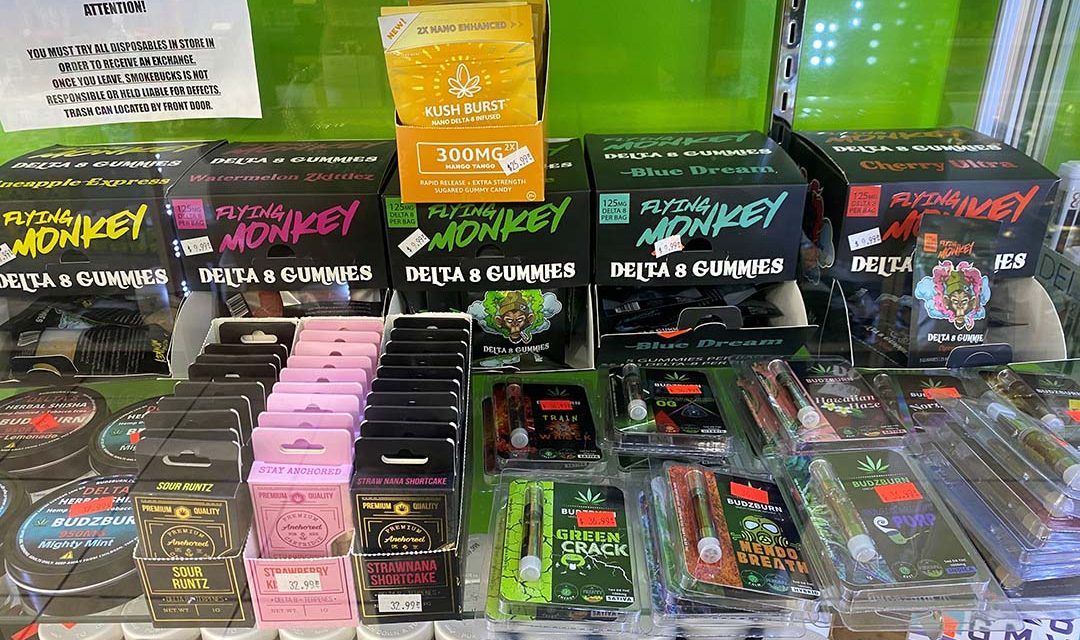Poison Control: The Other Delta. Delta-8: The New THC Derivative
This article is part of the following sections:
What is delta-8 tetrahydrocannabinol?
Delta-8 tetrahydrocannabinol (THC), or “Weed Light,” is an analog of delta-9 THC with potential antiemetic, anxiolytic, appetite-stimulating, and analgesic properties. [1] Delta-8 THC is found naturally in extremely low concentrations in hemp, but it can also be chemically derived or genetically altered from hemp. The genus Cannabis has three different species: sativa, indica, and ruderalis. Hemp is a subspecies of C. sativa that contains low concentrations of delta-9 THC (the psychoactive component responsible for the “high” effects) and high amounts of cannabidiol. Hemp has been cultivated for years to commercially produce ropes, textiles, shoes, food, and even paper.
The structural difference between delta-8 and delta-9 THC is the location of the double bond which is found on the 8th carbon instead of the 9th carbon. Because of this difference, it has milder psychoactive properties [2] and potentially has fewer adverse effects.
Is delta-8 THC legal?
Under federal law, delta-8 THC is considered legal. The United States Agriculture Improvement Act of 2018 (2018 farm bill) removed hemp from the federal list of controlled substances allowing the sale and use of hemp-derived products that contain no more than 0.3% delta-9 THC. [3] However, this law does not address delta-8-THC necessitating some states to take action and successfully ban this compound’s use and sale. In Florida, there is no existing legislation to ban or deter the sales of delta-8 THC. According to the Florida Department of Agriculture and Consumer Services, hemp or hemp extract products offered for sale in Florida must comply with all labeling requirements and have a certificate of analysis that shows delta-9 THC content less than 0.3%. [4] Therefore, since delta-8 THC can be derived from hemp, it is considered legal as long as the hemp used for its production meets these requirements. (Hemp derived products are considered a dietary supplement and are not required to be proven safe prior to marketing).
Would delta-8 THC cause a positive on a marijuana screen?
Delta-8 THC is very structurally similar to delta-9 THC resulting in cross-reactivity on some assays. Therefore, even if a laboratory assay is not capable of determining between delta-8 THC and delta-9 THC, it will still likely produce a positive marijuana screen result.
Why is there such a craze behind delta-8, and what is the mechanism of action?
Delta-8 THC is also known as “legal weed,” and users can take it recreationally without worrying about breaking the law with its consumption. Unlike delta-9 THC, medical marijuana cards are not needed for its purchase and delta-8 THC is readily available at smoke shops, gas stations, dispensaries, online storefronts, etc.
Delta-8 THC binds to the cannabinoid G-protein coupled receptor CB1 located throughout the body, but especially in the central and peripheral nervous system. [1,5] Users report that it offers the same medical benefits as delta-9 THC with a milder high and a reduction of the negative side effect intensity of anxiety, paranoia, confusion, impaired motor or cognitive function.
What are the risks of using delta-8 THC?
The primary risk of using delta-8 THC is the lack of regulation by the FDA. While delta-8 THC is considered legal from a federal standpoint, it is not subject to the safety and efficacy standards set by the FDA. [3] This lack of regulation leaves a high margin of error due to variations in manufacturing processes and a lack of analysis for adulterants in the final product. Furthermore, because of the absence of regulation, and delta-8 THC existing in a “legal grey area,” there are no age restrictions on the sale of delta-8 THC therefore allowing children to purchase these products. [7]
According to a report published by the United States Cannabis Counsel (USCC) in June of 2021, the sale of unregulated delta-8 products “presents a public health risk of potentially wider impact than the vape crisis.” [8] The USCC conducted a study where 16 delta-8 THC products purchased from California, Florida, Nevada, Texas, Michigan, Massachusetts, North Carolina and Indiana were tested for ingredient accuracy. [8] The results of these tests found varying amounts delta-8 THC and delta-9 THC, as well as heavy metals and pesticides. In addition to these adulterants, dichloromethane was found in many of the samples. Dichloromethane is used in the extraction process of delta-8 THC but can emit highly toxic fumes when exposed to heat. [3,8]
Regardless of the lack of regulation and high probability of adulterants, delta-8 THC can produce many unwanted effects. Of note, cannabinoid hyperemesis syndrome (CHS), which is characterized by cyclic vomiting, is one of the most severe effects. Delta-8 THC can also produce psychotropic effects similar to the ones produced by delta-9 THC, albeit, delta-8 THC’s effects are said to be milder. [4,9] Exposure to delta-8 may impair cognitive function and other neurologic functions such as driving a car, operating heavy machinery or completing other tasks that require a high level of focus. Additionally, delta-8 products are available to all age groups, including children. Similar to delta-9 THC, delta-8 THC can cause more pronounced and persistent symptoms in pediatrics. [10]
How do we manage the adverse effects?
Since delta-8 THC is a relatively new hemp derivative, little is known on exact treatment strategies for adverse effects. As with delta-9 THC, the mainstay of treatment for adverse effects associated with delta-8 is largely symptomatic and supportive care. [10] There has been one well defined case of delta-8 THC induced CHS in which the patient was treated with capsaicin cream. Additional possible treatments for CHS include warm showers, haloperidol, benzodiazepines, and IV fluids for volume loss. [4] Antiemetics are usually not effective in CHS. The only definitive treatment for CHS is cessation of cannabis use. Any patient, especially a pediatric patient, with persistent symptoms of CHS or neurologic/cognitive dysfunction should be admitted for further observation and supportive care. [10]
Health care professionals at the Florida Poison Information Center Network are available at 1-800-222-1222 to answer questions concerning, or assist in the management of, this or any other toxic exposure.
References:
- National Center for Biotechnology Information (2021). PubChem Compound Summary for CID 638026, delta8-Tetrahydrocannabinol. Retrieved August 16, 2021.
- Razdan RK. Structure-activity relationships in cannabinoids. Pharmacol Rev. 1986;38(2):75-149.
- Abernethy, A. (2019, July 25). Hemp production and the 2018 farm bill. U.S. Food and Drug Administration.
- Rosenthal J, Howell M, Earl V, Malik M. Cannabinoid Hyperemesis Syndrome Secondary to Delta-8 THC Use [published online ahead of print, 2021 Jul 31]. Am J Med. 2021;S0002-9343(21)00486-1.
- Delta 8. Florida Department of Agriculture and Consumer Services. Title XXXV. Statute 581.217; State Hemp Program.
- Zou S, Kumar U. Cannabinoid Receptors and the Endocannabinoid System: Signaling and Function in the Central Nervous System. Int J Mol Sci. 2018;19(3):833. Published 2018 Mar 13.
- The increasing popularity of Delta 8 raises concerns. Addiction Center. (2021, July 29). https://www.addictioncenter.com/news/2021/07/increasing-popularity-delta-8/.
- US Cannabis Counsel. The Unregulated Distribution And Sale Of Consumer Products Marketed As Delta-8 THC; The Health Risks of Delta-8 THC and What’s Needed Now. Executive summary. 2-24. Retrieved August 19, 2021.
- Toxicology rounds: Your ed patients are likely using… Emergency medicine news. LWW. (n.d.).
- Plants-Marijuana. In: IBM Micromedex POISINDEX (electronic version). IBM Watson Health, Greenwood Village, Colorado, USA. Available at: www.micromedexsolutions.com/ (cited: August 19, 2021).







